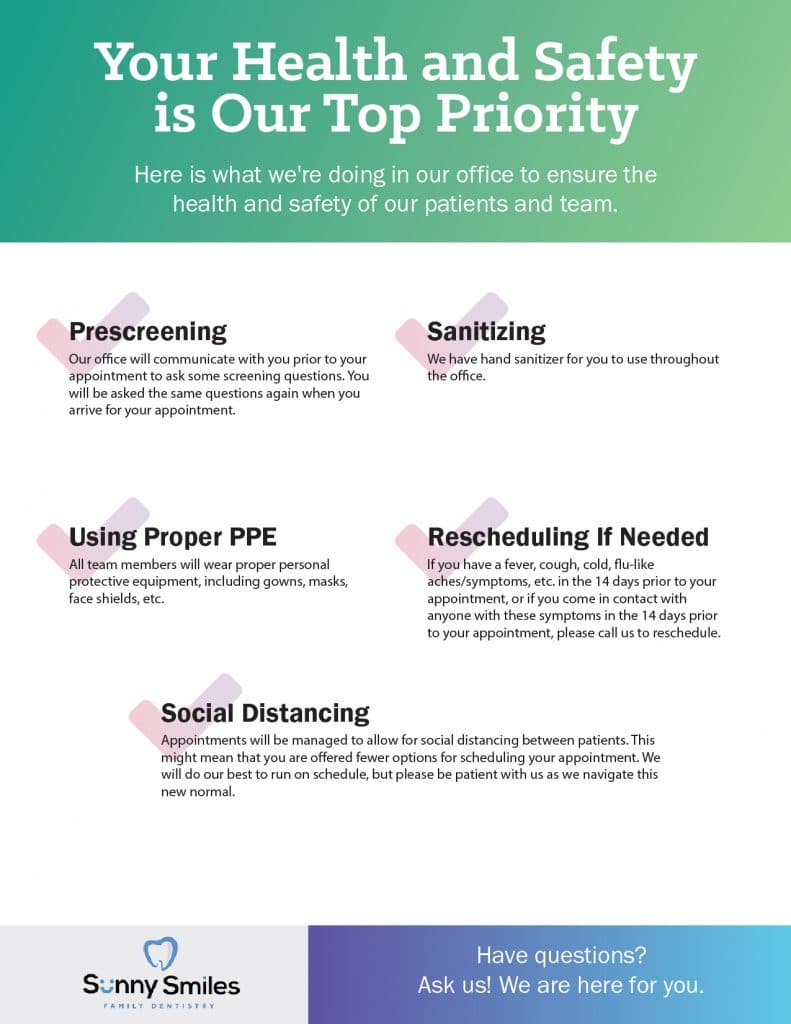 Is there a cosmetic dental treatment available to address the specific issues you have with your smile? You can be surprised by just how effective a procedure can be at correcting a range of different appearance flaws. You can see to it that your teeth look brighter and healthier, while also hiding alignment flaws that might bother you, with a single procedure! At our El Paso, TX dental practice, we are committed to helping people show off truly great smiles. If you want to know what can be done to make you excited about the way you look, we can work with you to provide all of your desired improvements. (more…)
Is there a cosmetic dental treatment available to address the specific issues you have with your smile? You can be surprised by just how effective a procedure can be at correcting a range of different appearance flaws. You can see to it that your teeth look brighter and healthier, while also hiding alignment flaws that might bother you, with a single procedure! At our El Paso, TX dental practice, we are committed to helping people show off truly great smiles. If you want to know what can be done to make you excited about the way you look, we can work with you to provide all of your desired improvements. (more…)
Do You Need Urgent Care Due To Dental Discomfort?
 If you start to experience tooth pain, or uncomfortable problems with your bite, you may consider the matter something to discuss with your dentist. While you can recognize that something is wrong, you may be unsure of whether to treat the situation as urgent. You can be happy to know that when patients need emergency dental work, our El Paso, TX dental practice can offer that care to them. If you think your issues with discomfort might call for prompt attention, please let us know. We can make sure that the matter is successfully addressed through restorative dental work before the situation worsens, and complications require additional care. (more…)
If you start to experience tooth pain, or uncomfortable problems with your bite, you may consider the matter something to discuss with your dentist. While you can recognize that something is wrong, you may be unsure of whether to treat the situation as urgent. You can be happy to know that when patients need emergency dental work, our El Paso, TX dental practice can offer that care to them. If you think your issues with discomfort might call for prompt attention, please let us know. We can make sure that the matter is successfully addressed through restorative dental work before the situation worsens, and complications require additional care. (more…)
What Is Tartar, And How Can It Affect Your Smile?
 If you start to notice unsightly deposits on teeth, you may be seeing an accumulation of tartar. If you have tried to address the matter by brushing and flossing, you can attest to how difficult these deposits are to remove. Fortunately, the substance can be addressed during a professional dental cleaning! At our El Paso, TX dental practice, you can come in for a routine checkup and cleaning session. Your hygienist will remove any buildup of tartar found on teeth, while also checking for – and removing – plaque, and food debris. Removing tartar is about more than just improving your smile. When this substance is not dealt with, you can be more vulnerable to tooth decay and gum disease! (more…)
If you start to notice unsightly deposits on teeth, you may be seeing an accumulation of tartar. If you have tried to address the matter by brushing and flossing, you can attest to how difficult these deposits are to remove. Fortunately, the substance can be addressed during a professional dental cleaning! At our El Paso, TX dental practice, you can come in for a routine checkup and cleaning session. Your hygienist will remove any buildup of tartar found on teeth, while also checking for – and removing – plaque, and food debris. Removing tartar is about more than just improving your smile. When this substance is not dealt with, you can be more vulnerable to tooth decay and gum disease! (more…)
Prevent Problems After Tooth Loss With Dental Implants
 You can have an understandable problem with the way you look if you suffer tooth loss. Unfortunately, this issue does more than just change a person’s smile. You can find that biting and chewing become more difficult when you have to work around the absence of just one tooth. Over time, unaddressed tooth loss can put neighboring teeth at risk for being lost, while also creating problems with your jawbone. If you want to make sure you address these problems associated with tooth loss, talk to your El Paso, TX dental office about dental implants! Implants can be used to replace individual missing teeth, and they can be used to hold larger restorations. (more…)
You can have an understandable problem with the way you look if you suffer tooth loss. Unfortunately, this issue does more than just change a person’s smile. You can find that biting and chewing become more difficult when you have to work around the absence of just one tooth. Over time, unaddressed tooth loss can put neighboring teeth at risk for being lost, while also creating problems with your jawbone. If you want to make sure you address these problems associated with tooth loss, talk to your El Paso, TX dental office about dental implants! Implants can be used to replace individual missing teeth, and they can be used to hold larger restorations. (more…)
Arranging Treatment To Deal With Significant Teeth Stains
 Significant teeth stains can be difficult to address when you only try to address the problem with store bought whitening products. These products can help you make improvements by removing stains from the surface of your teeth, but you can have particles below the surface of your enamel that remain. If you want to see a more remarkable change to your smile, talk with your El Paso, TX dentist about a professional teeth whitening treatment! The whitening treatment available at our practice includes custom trays, and bleaching gels strong enough to remove the stains that are difficult to remove with over the counter products! (more…)
Significant teeth stains can be difficult to address when you only try to address the problem with store bought whitening products. These products can help you make improvements by removing stains from the surface of your teeth, but you can have particles below the surface of your enamel that remain. If you want to see a more remarkable change to your smile, talk with your El Paso, TX dentist about a professional teeth whitening treatment! The whitening treatment available at our practice includes custom trays, and bleaching gels strong enough to remove the stains that are difficult to remove with over the counter products! (more…)
Take Part In A Rare Plant Tour July 13!
 On Saturday, July 13, you can explore the great outdoors of El Paso, and learn abut the local fauna, by joining the Rare Plant Tour! A guided tour, led by a local expert, can introduce you to the many interesting species that exist around our community. You can even learn how to identify some of these lovely, strange plants in the Hueco Tanks area, and see a tree that is exclusive to our region! While the Rare Plant Tour is a great learning opportunity, it also serves as your chance to take in some exercise, which can help you maintain your physical health. Did you know that healthy gums can also have an impact on your well-being? Your El Paso, TX dentist can check on the condition ofy our periodontal tissues during your next routine dental exam! (more…)
On Saturday, July 13, you can explore the great outdoors of El Paso, and learn abut the local fauna, by joining the Rare Plant Tour! A guided tour, led by a local expert, can introduce you to the many interesting species that exist around our community. You can even learn how to identify some of these lovely, strange plants in the Hueco Tanks area, and see a tree that is exclusive to our region! While the Rare Plant Tour is a great learning opportunity, it also serves as your chance to take in some exercise, which can help you maintain your physical health. Did you know that healthy gums can also have an impact on your well-being? Your El Paso, TX dentist can check on the condition ofy our periodontal tissues during your next routine dental exam! (more…)
We Can Provide Relief If You Are Experiencing Dental Pain
 Dental pain is an intrusive, frustrating problem – it can also be a warning that something is really wrong with your oral health. If you try to ignore discomfort, even as it continues to assert its presence, you should know that you could be ignoring a problem that can worsen over time. If the pain is concentrated in your tooth, you might be dealing with an advanced cavity. Pain that is more general could be a byproduct of TMJ dysfunction, which can lead to difficult dental function, teeth grinding, and issues with chronic headaches. At our El Paso, TX dental practice, we can work with patients to determine why they have pain, then recommend the appropriate restorative dental treatment. (more…)
Dental pain is an intrusive, frustrating problem – it can also be a warning that something is really wrong with your oral health. If you try to ignore discomfort, even as it continues to assert its presence, you should know that you could be ignoring a problem that can worsen over time. If the pain is concentrated in your tooth, you might be dealing with an advanced cavity. Pain that is more general could be a byproduct of TMJ dysfunction, which can lead to difficult dental function, teeth grinding, and issues with chronic headaches. At our El Paso, TX dental practice, we can work with patients to determine why they have pain, then recommend the appropriate restorative dental treatment. (more…)
Can One Cosmetic Treatment Address Multiple Issues?
 How much difference can you really make for your appearance if you only schedule one cosmetic dental treatment? How many steps are going to be required if you want to deal with multiple flaws? These are important questions – after all, a person’s willingness to undergo cosmetic work can be affected by what they think the process might require. You can be happy to know that your El Paso, TX dentist’s office can provide cosmetic services that are able to address many different concerns in less time than you expect. With the right treatment, you can cover up concerns about dental damage, discoloration, and congenital problems with the shape and size of teeth. (more…)
How much difference can you really make for your appearance if you only schedule one cosmetic dental treatment? How many steps are going to be required if you want to deal with multiple flaws? These are important questions – after all, a person’s willingness to undergo cosmetic work can be affected by what they think the process might require. You can be happy to know that your El Paso, TX dentist’s office can provide cosmetic services that are able to address many different concerns in less time than you expect. With the right treatment, you can cover up concerns about dental damage, discoloration, and congenital problems with the shape and size of teeth. (more…)
Regular Checkups Make Your Oral Health Easier To Manage
 How much effort are you currently putting towards preserving the health of your teeth and gums? Hopefully, each day finds you keeping up with good brushing and flossing habits, while also making sure your diet choices are smile-friendly. When you maintain good habits at home, you can limit your risk for trouble, but this does not mean your routine should take the place of regular dental checkups! At every visit to your El Paso, TX dentist’s office, you can receive valuable preventive care – each visit includes a careful review of your smile, and a thorough cleaning of your teeth to remove harmful agents. (more…)
How much effort are you currently putting towards preserving the health of your teeth and gums? Hopefully, each day finds you keeping up with good brushing and flossing habits, while also making sure your diet choices are smile-friendly. When you maintain good habits at home, you can limit your risk for trouble, but this does not mean your routine should take the place of regular dental checkups! At every visit to your El Paso, TX dentist’s office, you can receive valuable preventive care – each visit includes a careful review of your smile, and a thorough cleaning of your teeth to remove harmful agents. (more…)
What Options Do I Have For Restoring My Incomplete Smile?
 There are several options you can pursue when you want to do something about tooth loss. You can look into a single-tooth restoration to close a smile gap, or talk to your El Paso, TX dentist about receiving a larger prosthetic appliance to replace multiple missing teeth. You can also opt for dental implant support with your restoration, which can have important benefits for your long-term dental health, and your appearance. One thing you should know is that if you continue to put off work to restore your full smile, you can run into problems related to tooth loss that can become frustrating, and can seriously interfere with your quality of life! (more…)
There are several options you can pursue when you want to do something about tooth loss. You can look into a single-tooth restoration to close a smile gap, or talk to your El Paso, TX dentist about receiving a larger prosthetic appliance to replace multiple missing teeth. You can also opt for dental implant support with your restoration, which can have important benefits for your long-term dental health, and your appearance. One thing you should know is that if you continue to put off work to restore your full smile, you can run into problems related to tooth loss that can become frustrating, and can seriously interfere with your quality of life! (more…)




